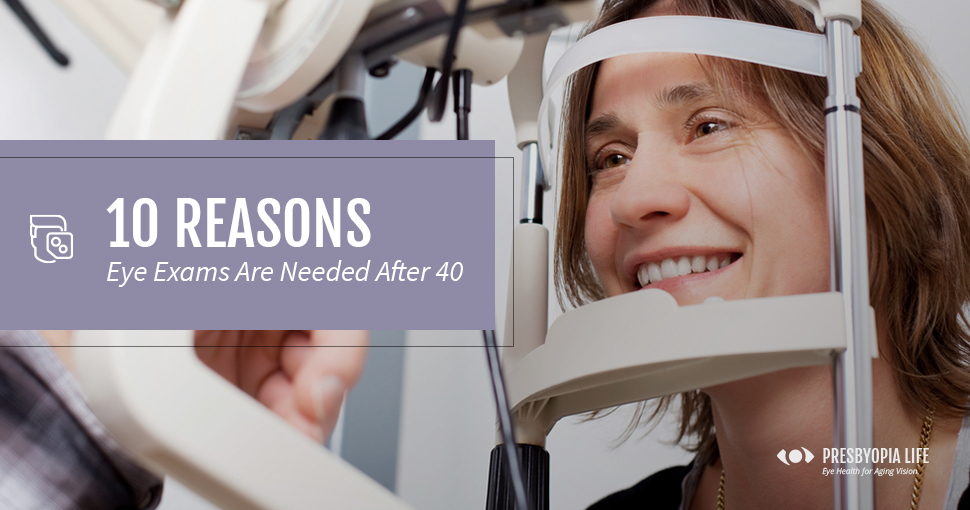10 Reasons You Need Regular General Eye Exams After 40

Your late 30’s to early 40’s can be a very busy time in life, especially if job stress, child-rearing, family obligations, and social commitments are all in play. It is also more important than ever to take care of yourself! How you manage your health now can have a major impact on your overall well-being throughout the rest of your life. One of the best health decisions you can make is to have regular comprehensive eye exams.
Some people neglect to get eye exams because they are busy, because they don’t think they need one, or because they don’t like going to the doctor. However, regular eye exams are an easy way to practice self-care while protecting your vision! Here are 10 reasons why you need to schedule an eye exam:
1. Establish Baseline Eye Health
The American Academy of Ophthalmology recommends that everyone have a comprehensive eye exam around the age of 40 even if they are not experiencing any vision changes or eye symptoms.

2. Watch for Age-Related Eye Diseases
As we get older, we are at risk of developing eye diseases such as cataracts, age-related macular degeneration (AMD), and glaucoma; eye exams are vital because many of these eye diseases do not have any symptoms in the early stages.

3. Prevent Irreversible Damage
Glaucoma is a leading cause of blindness worldwide and over 2.7 Americans over the age of 40 are affected by open-angle glaucoma.


4. Protect Your Overall Health With Disease Detection
Did you know that your eye doctor can determine a lot about your health by examining your eyes? In a dilated eye exam, an experienced eye doctor can detect signs of diabetes, hypertension, autoimmune conditions, and certain cancers – often before you may be experiencing symptoms.

5. Deal With Digital Eye Strain
Many jobs today require significant computer work, but spending hours a day looking at a screen can take a toll on our eyes. The American Optometric Association describes a condition called Digital Eye Strain, or Computer Vision Syndrome, as causing headaches, dry eyes, blurred vision, and neck and shoulder pain.

6. Evaluate Sun Damage
Most people are aware of the risks that UV rays pose to our skin health, but did you know that eyes can also suffer from sun damage? UV exposure can increase your risk of cataracts, macular degeneration, and growths called pterygium.

7. Diagnose Ocular Allergies
Seasonal allergies commonly cause sneezing, congestion, and coughing. They also cause red, watery, itchy, puffy eyes. While mild allergies can be treated with over-the-counter medications, visual complications can occur from frequent eye rubbing or from more serious ocular allergies. Atopic keratoconjunctivitis (AKC) and Vernal keratoconjunctivitis (VKC) are two forms of ocular allergies that require treatment from an eye doctor in order to prevent vision loss.

8. Stay Safe While Driving
Motor vehicle crashes account for over 2 million injuries and over 37,000 deaths per year in the United States.


9. Get Reading Vision Solutions for Presbyopia
After 40, you may find yourself squinting at text messages or holding books and menus further from your face. The reason may be presbyopia, a naturally occurring loss of near vision that happens due to age-related changes in the lens of your eye. Reading glasses are a common treatment, but your eye doctor can talk to you about other options if you’d like to skip the readers.

10. Keep Your Prescription Updated
Online shopping has given us the ability to order cheap and stylish glasses from the comfort of our own homes. Just because you can order online with last year’s prescription doesn’t mean that you should skip your annual eye exam. You may not notice gradual changes in your vision, so it is important to see your eye doctor to keep your prescription up to date.
 Sources
Sources
1 American Academy of Ophthalmology. Preferred Practice Patterns Committee. Preferred Practice Pattern® Guidelines. Comprehensive Adult Medical Eye Evaluation. San Francisco, CA: American Academy of Ophthalmology; 2015. Available at: https://www.aao.org/preferred-practice-pattern/comprehensive-adult-medical-eye-evaluation-2015 Accessed October 9, 2019.
2 National Eye Institute. Vision and Aging Resources. Available at: https://nei.nih.gov/learn-about-eye-health/resources-for-health-educators/vision-and-aging-resources Accessed October 9, 2019
3 Bright Focus Foundation. Sources for Glaucoma: Facts & Figures. Available at:
https://www.brightfocus.org/sources-glaucoma-facts-figures Accessed October 9, 2019.
4 Glaucoma Research Foundation. Symptoms of Open-Angle Glaucoma. Available at: https://glaucoma.org/understanding-glaucoma/symptoms Accessed March 6, 2024.
5 American Academy of Ophthalmology. Your Eyes Could Be the Windows to Your Health. Available at: https://www.aao.org/eye-health/tips-prevention/diagnosing-systemic-diseases-eye-exams. Accessed October 9, 2019.
6 American Academy of Ophthalmology. Computer Vision Syndrome. Available at: https://www.aoa.org/patients-and-public/caring-for-your-vision/protecting-your-vision/computer-vision-syndrome Accessed October 9, 2019.
7 Current Health Sciences Journal. Clinical Aspects of Pterygium in the Presence of Cataract. Available at: https://www.ncbi.nlm.nih.gov/pmc/articles/PMC6993772/ Accessed June 23, 2020.
8 Massachusetts Eye Research and Surgery Institution. Ocular Allergy. Available at: https://www.mersi.com/services/what-we-treat/ocular-allergy/ Accessed October 10, 2019.
9 Safe Driving for Older Adults. Available at: https://www.nia.nih.gov/health/older-drivers Accessed September 11, 2023.
10 AARP. How Your Eyes Change With Age. Available at: https://www.aarp.org/health/conditions-treatments/info-2019/eye-changes-with-age.html Accessed October 10, 2019.
11 American Academy of Ophthalmology. Presbyopia Treatment. Available at: https://www.aao.org/eye-health/diseases/presbyopia-treatment Accessed October 10, 2019.




